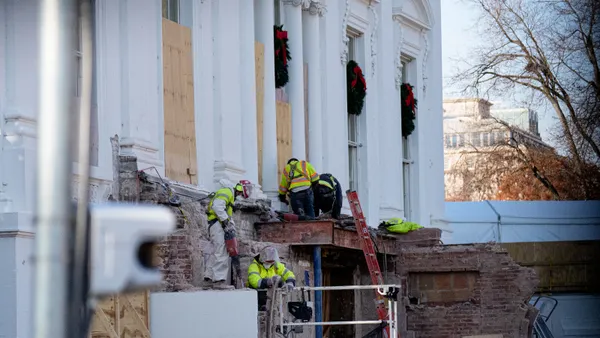Dive Brief:
- New York City contractor ICS Builders is suing Brooklyn-based Fortis Property Group for wrongful termination and alleged past due bills of $3.4 million, plus interest, costs and fees. Fortis hired ICS in July of 2016 to convert a former Long Island College Hospital building in Brooklyn into luxury condominiums, according to Crain's New York Business.
- In its lawsuit, ICS said it was supposed to complete the project by Nov. 10, 2017, but could not because of delays caused by Fortis, the architect and other parties to the project, including inability to access the jobsite, deficient plans and specifications, unforeseen site conditions and "improper" applications to the New York City Department of Buildings. Nevertheless, ICS maintains Fortis allowed it to continue working on the project, where ICS made substantial progress until it received an Aug. 9 termination letter, effective Aug. 31, from Fortis.
- In addition to payment for project invoices, which ICS said Fortis has not disputed, ICS also has asked the court to stop Fortis from terminating its construction contract and from making a claim against the performance bond ICS provided. ICS said Fortis' termination will prevent it from obtaining future work and will force ICS to shut down. The contractor also claims that if Fortis makes a claim on its performance bond, it will negatively affect ICS's credit rating and reputation and will prevent the company from obtaining future surety bonds for other projects.
Dive Insight:
The qualification process for obtaining a surety bond can be a rigorous one that includes credit checks on the company and its principals, a thorough look at the company's financials and, as ICS suggests in its lawsuit, a look back at previous bonded projects and their outcomes. This makes sense because, even though bonds are sometimes referred to as "insurance," they are not. Any losses a surety company sustains in relation to a bond must be paid back by the company or by those who personally guaranteed the bond.
The inability to clear that pre-bonding process and obtain performance and payment bonds pretty much locks out contractors from being able to compete for significant government work at federal, state and local levels, as public entities almost always require contractors provide such bonds. Those same companies could also be prevented from qualifying for large private projects that opt to request payment and performance bonds from their contractors.
Construction bonds are also fairly expensive, so there are some alternatives that owners might be willing to consider, including a letter of credit or subcontractor default insurance. Private owners have more leeway when deciding to accept an alternative to traditional surety bonds, as many governmental agencies are constrained by laws that govern bidding and procurement for publicly funded projects.













